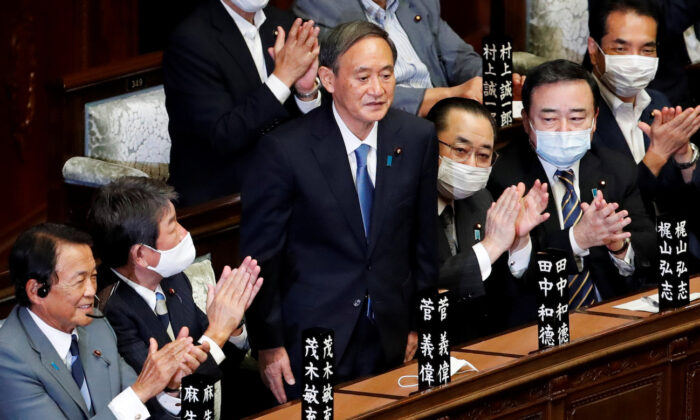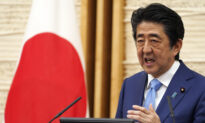Justice Department Watchdog Probing Handling of Stone Sentencing
TOKYO—Japan’s Parliament elected Yoshihide Suga as prime minister Wednesday, replacing long-serving leader Shinzo Abe with his right-hand man.
Suga had been chosen as leader of the ruling party on Monday, virtually assuring he would succeed Abe, who resigned earlier in the day because of ill health. Suga, who was chief Cabinet secretary in Abe’s government, is to launch his own Cabinet later Wednesday.
Suga has stressed his background as a farmer’s son and a self-made politician in promising to serve the interests of ordinary people and rural communities.
He has said he will pursue Abe’s unfinished policies, and that his top priorities will be fighting the coronavirus and turning around an economy battered by the pandemic.
 Japan’s outgoing Prime Minister Shinzo Abe speaks to the media as he arrives at the prime minister’s office for a cabinet meeting, in Tokyo, Japan, on Sept. 16, 2020. (AP Photo/Eugene Hoshiko)
Japan’s outgoing Prime Minister Shinzo Abe speaks to the media as he arrives at the prime minister’s office for a cabinet meeting, in Tokyo, Japan, on Sept. 16, 2020. (AP Photo/Eugene Hoshiko)Abe said before the change was official that as a lawmaker, he will support Suga’s government and he thanked the people for their understanding and strong support for the upcoming leadership under Suga.
“I devoted my body and soul for the economic recovery and diplomacy to protect Japan’s national interest every single day since we returned to power,” Abe told reporters at the prime minister’s office before heading into his final Cabinet meeting. “During this time, I was able to tackle various challenges together with the people, and I’m proud of myself.”
Suga gained the support of party heavyweights and their followers early in the campaign on expectations he would continue Abe’s line.
Suga has been a loyal supporter of Abe since Abe’s first stint as prime minister from 2006 to 2007. Abe’s tenure ended abruptly because of illness, and Suga helped him return as prime minister in 2012.
Abe, 65, has ulcerative colitis and his current treatment requires IV injections. He said last month his condition has improved but, facing ongoing treatment and physical weakness, he decided to resign.
Suga has praised Abe’s diplomacy and economic policies when asked about what he would like to accomplish as prime minister.
Suga, who does not belong to any wing within the party and opposes factionalism, says he is a reformer who will break down vested interests and rules that hamper reforms. He says he will set up a new government agency to speed up Japan’s lagging digital transformation.
In a reshuffle of the ruling party key posts, however, Suga evenly allocated top posts to key factions, a balancing act seen as a return of favor for their support in the leadership race.
Suga said he will appoint “reform-minded, hard-working people” to the new Cabinet. About half of the members in the Abe Cabinet are expected to be retained or shifted to different ministerial posts.
Media reports say some key ministers, including Finance Minister Taro Aso, Foreign Minister Toshimitsu Motegi, Olympic Minister Seiko Hashimoto, and Environment Minister Shinjiro Koizumi, the son of former Prime Minister Junichiro Koizumi, will stay. Abe’s younger brother, Nobuo Kishi, is reportedly tapped as defense minister, replacing Taro Kono who is expected be shifted to administrative reforms minister.
Compared to his political prowess at home, Suga has hardly traveled overseas and his diplomatic skills are unknown, though he is largely expected to pursue Abe’s priorities.
The new prime minister will inherit a range of challenges, including relations with China, which continues its assertive actions in the contested East China Sea, and what to do with the Tokyo Olympics, which were postponed to next summer due to the coronavirus. And he will have to establish a good relationship with whomever wins the U.S. presidential race.
By Mari Yamaguchi
Focus News: Yoshihide Suga Named Japan’s Prime Minister, Succeeding Abe
Daimler to Pay $2.2 Billion in Diesel Emissions Cheating Settlements

